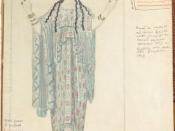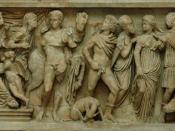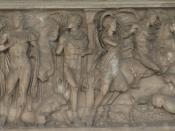Distinguishing the Tragic Hero
"Not recognizing her beloved, she both looks at him and asks where he may be. At last she knows too well what's lying there; she lifts to the Gods a sad, accusing stare; then, moaning, cold, and all but dead, the sweet maid drops unconscious at her lover's feet" (p. 401). From this phrase alone, it is obvious that Jean Racine's Phaedra (1677) is a tragic play, featuring a tragic hero. The tragic hero is defined as a person of high estate, who demonstrates both good and bad qualities, and most distinguishingly, is the cause of the tragedy due to a personal error in judgment or tragic flaw. In Phaedra, there are three characters that demonstrate the first two of these characteristics, however only one character, Phaedra, is responsible for the tragedy in the play and therefore, is the tragic hero.
Distinguishing the persons of high estate from the commoners is quite simple and is an important first step in identifying potential tragic heroes.
Hippolytus is referred to by Theramenes (his tutor) as "my lord" (p. 365), which is indicative of Hippolytus' high status. This idea is confirmed when Hippolytus is revealed as the King's son, which makes him a prince. Theseus, the King of Athens and Phaedra, his Queen, are also characters of high estate. As princess of the blood royal of Athens, Aricia could also be considered "high status" however, as Theseus' enemy her status is actually lower than that of a commoner. The remaining characters, Theramenes, Oenone, Ismene, and Panope are servants and confidants, not people of nobility or high status. Therefore, of the eight characters, Hippolytus, Theseus, and Phaedra are the potential tragic heroes in the play.
The tragic hero must demonstrate both good and bad traits. Phaedra, the stepmother of...


